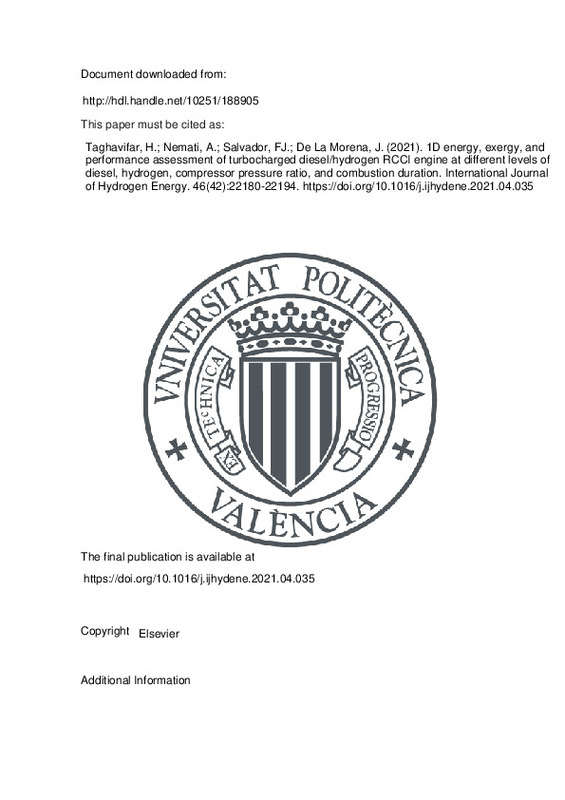JavaScript is disabled for your browser. Some features of this site may not work without it.
Buscar en RiuNet
Listar
Mi cuenta
Estadísticas
Ayuda RiuNet
Admin. UPV
1D energy, exergy, and performance assessment of turbocharged diesel/hydrogen RCCI engine at different levels of diesel, hydrogen, compressor pressure ratio, and combustion duration
Mostrar el registro sencillo del ítem
Ficheros en el ítem
| dc.contributor.author | Taghavifar, Hadi
|
es_ES |
| dc.contributor.author | Nemati, Arash
|
es_ES |
| dc.contributor.author | Salvador, Francisco Javier
|
es_ES |
| dc.contributor.author | De La Morena, Joaquín
|
es_ES |
| dc.date.accessioned | 2022-10-28T10:28:51Z | |
| dc.date.available | 2022-10-28T10:28:51Z | |
| dc.date.issued | 2021-06-18 | es_ES |
| dc.identifier.issn | 0360-3199 | es_ES |
| dc.identifier.uri | http://hdl.handle.net/10251/188905 | |
| dc.description.abstract | [EN] There is a growing concern about the feasibility of a new generation of internal combustion engines in a low-temperature and efficient way that can meet the emission regulations while maintaining the desirable power performance. This requires the controllability and flexibility over the ignition and reactivity within the cylinder by handling two fuels with different chemical reaction intensity. In this research, the reactivity controlled compression ignition (RCCI) turbocharger-assisted engine is proposed that operates with diesel hydrogen fuels. After calibration and model validation, the effect of pressure ratio of compressor in turbocharger, hydrogen energy share, diesel mass per cycle, and combustion duration on temperature rise, entropy, pressure, heat release, and engine performance is evaluated. The design variables effects on the exergy share of work, heat, exhaust loss, irreversibility, and exergetic performance coefficient (EPC) are assessed and analyzed. Increasing the compressor pressure ratio can significantly increase the engine power and reduce fuel consumption. It is proved that turbocharging can reduce the entropy generation and thereby reduce irreversibility. The lower diesel injection is favored in terms of the work exergy and the EPC. | es_ES |
| dc.language | Inglés | es_ES |
| dc.publisher | Elsevier | es_ES |
| dc.relation.ispartof | International Journal of Hydrogen Energy | es_ES |
| dc.rights | Reconocimiento - No comercial - Sin obra derivada (by-nc-nd) | es_ES |
| dc.subject | 1D thermodynamic simulation | es_ES |
| dc.subject | Diesel | es_ES |
| dc.subject | Exergy | es_ES |
| dc.subject | Hydrogen | es_ES |
| dc.subject | RCCI | es_ES |
| dc.subject | Turbocharging | es_ES |
| dc.subject.classification | MAQUINAS Y MOTORES TERMICOS | es_ES |
| dc.title | 1D energy, exergy, and performance assessment of turbocharged diesel/hydrogen RCCI engine at different levels of diesel, hydrogen, compressor pressure ratio, and combustion duration | es_ES |
| dc.type | Artículo | es_ES |
| dc.identifier.doi | 10.1016/j.ijhydene.2021.04.035 | es_ES |
| dc.rights.accessRights | Abierto | es_ES |
| dc.contributor.affiliation | Universitat Politècnica de València. Departamento de Máquinas y Motores Térmicos - Departament de Màquines i Motors Tèrmics | es_ES |
| dc.description.bibliographicCitation | Taghavifar, H.; Nemati, A.; Salvador, FJ.; De La Morena, J. (2021). 1D energy, exergy, and performance assessment of turbocharged diesel/hydrogen RCCI engine at different levels of diesel, hydrogen, compressor pressure ratio, and combustion duration. International Journal of Hydrogen Energy. 46(42):22180-22194. https://doi.org/10.1016/j.ijhydene.2021.04.035 | es_ES |
| dc.description.accrualMethod | S | es_ES |
| dc.relation.publisherversion | https://doi.org/10.1016/j.ijhydene.2021.04.035 | es_ES |
| dc.description.upvformatpinicio | 22180 | es_ES |
| dc.description.upvformatpfin | 22194 | es_ES |
| dc.type.version | info:eu-repo/semantics/publishedVersion | es_ES |
| dc.description.volume | 46 | es_ES |
| dc.description.issue | 42 | es_ES |
| dc.relation.pasarela | S\439425 | es_ES |







![[Cerrado]](/themes/UPV/images/candado.png)

